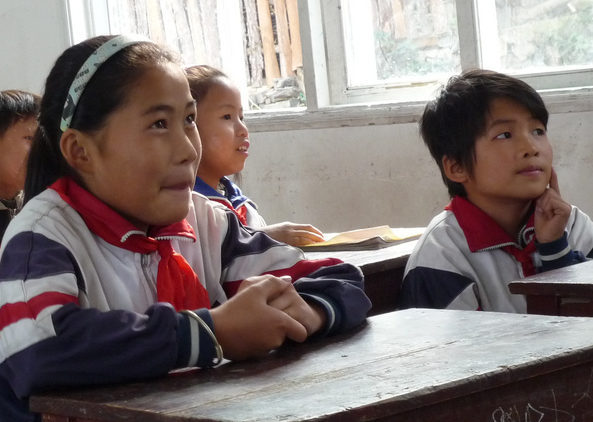27 September 2018
Renewing the People’s National Curriculum
China changes the rules.
By Jack Wippell
 The Communist Party has decreed that, by October 15th, all Chinese schools will have to hand over their teaching materials to the ministry of education’s officials, who will then proceed to weed out foreign content. This is no great revelation, textbook reviews have become much more common as the Communist Party has extended its reach, but the difference is that international schools, previously safe from the prying eyes of the super state, are included in this review. There has been a sizeable commotion in response. Westminster School’s new plans, announced late last year, to open up six new private schools in China by 2028 were openly criticized when it was revealed that they would only be teaching the ruling party’s Chinese national curriculum. Whilst the Westminster ethos and boarding will apparently still feature in these schools, it appears that the branding of ‘independent’ will not.
The Communist Party has decreed that, by October 15th, all Chinese schools will have to hand over their teaching materials to the ministry of education’s officials, who will then proceed to weed out foreign content. This is no great revelation, textbook reviews have become much more common as the Communist Party has extended its reach, but the difference is that international schools, previously safe from the prying eyes of the super state, are included in this review. There has been a sizeable commotion in response. Westminster School’s new plans, announced late last year, to open up six new private schools in China by 2028 were openly criticized when it was revealed that they would only be teaching the ruling party’s Chinese national curriculum. Whilst the Westminster ethos and boarding will apparently still feature in these schools, it appears that the branding of ‘independent’ will not.
But, why the commotion? There is definitely something understandable about a country acting to maintain a national curriculum. I have previously worked in one of these international venture schools in South Korea, teaching History to a class approaching their GCSE year. The school was modelled on the British system, and taught the Cambridge IGCSE international curriculum. Only once did the course ever mention the history of South Korea. Once. We taught the students about American independence, World War I and World War II, but only once, hidden in a small section discussing the United Nation’s involvement overseas, was there any mention of the Korean Peninsula. There is something very odd about teaching children the history of other countries without reference to their own. I can well understand why those in the Chinese government may wish for their students to be educated from a Chinese curriculum about Chinese history, rather than about the Western power’s near-constant colonial infighting from one of the unashamedly Eurocentric international curriculums.
But, what about the possible existence of unchecked political bias in the Chinese textbooks? It is true that the Chinese national curriculum is not the most impartial. With science and languages, and many other subjects, this is not of much concern. If the science is wrong, the experiment will not work. Yet science never tried to demonstrate the historical failings of a government so concerned with its own perfect image. History and politics are much more open to attack, and historical amnesia seems worryingly easy to fall into within a communist thinking which sees the formation of its state as the inevitable result of some predetermined “march of history”. However, it is not as if the West is innocent of such bias; far from it! When learning about all the English victories during the 100 Years War, as many do in history classrooms across Britain, one need only ask the teacher why, having won all these battles, England does not currently own France to see that a state encouraged, historical amnesia is flourishing. You cannot teach everyone everything and the cherry picking of events to make your nation look at the very least ‘good’ is bound to feature in any national curriculum.
The difference with China is that the events which reflect badly on the Communist Party took place pretty recently and this accentuates the unlikeliness that such events will be actively discussed. Hopefully, stories of the great errors of history made by some regimes will be passed down through the generations. Hopefully, as these events move further into the past, they will begin to feature more in the national history books (there is a sign of this already as some parts of the cultural revolution are now mentioned and, though mentioned briefly, they were ignored before). However, to think that bias in the national curriculum is unique to China is misguided and risks neglecting the larger educational issues.
“It doesn’t matter if a cat is black or white, it only matters if it catches mice”.
This maxim, originally formulated by Deng Xiaoping to discuss socialism in the years before the cultural revolution, can just as well be applied to education. Curriculums may vary a lot, but they should all be able to produce a reasoned and independent adult in command of their critical faculties.
The general picture painted by the coverage of these educational changes has been of a government very like the one presented in Ray Bradbury ’s Fahrenheit 451, where they burn books to suppress divergence and revolt. What we should be really concerned about is the possible surfacing of a much more Orwellian aim; that, through the promotion of blind faith in the party, the individual is rewired and there is then no need to burn the books in the first place. This is not a problem that necessarily follows from a historically selective curriculum. Nevertheless, there are unfortunate signs of such promotion already as political education is conducted by government officials. That these invigilators exist to pedal the ‘one-true’ party line is blatant. The Chinese teaching system also seems more prone to this type of indoctrination than its Western counterparts because learning by rote is still the chosen method, held above the Socratic questioning so popular in the West. Whilst ‘by rote’ may reign supreme for facts, figures and equations (it is well known that Asian countries lead the world in mathematics and sciences), when applied to specific viewpoints one can see how it could easily turn tyrannical.
The drive for a national curriculum is understandable, even justified, despite the hints towards totalitarianism in the press. However, if this drive turns out, as looks quite possible, to be rooted in a broader desire to limit any critical thinking at all then that is deeply unsettling thing. If the Chinese state wishes to reach an Orwellian book relationship, and succeeds in its aim of becoming the world’s dominant superpower, then education could take on a whole new meaning in the 21st century. Learning could come to value adherence above originality and that is not something which I see as particularly fulfilling. These international schools may now not have too much input into what they teach, but the aspect of their identity which they should strive to retain is how they teach it.


